On April 9, 2025, the PCP WISE consortium hosted its second Webstival webinar, titled “The PCP Process – From Call to Contract & Suppliers Matchmaking.” This session provided valuable insights into the Pre-Commercial Procurement (PCP) process, shared experiences from successful PCP projects, and outlined upcoming opportunities for suppliers.
The recording of the webinar is available here and webinar slides here
Opening Remarks
Joost Buntsma, Lead Procurer at hetWaterschapshuis (HwH), opened the session by welcoming participants and providing an overview of the PCP WISE initiative. He emphasized the project’s goal to develop innovative solutions addressing water-related challenges such as floods, fires, and resilient infrastructure, through a collaborative approach involving 26 partners across 9 countries.
Understanding the PCP Process
Dr. Ana Isabel Peiró Baquedano, Senior Legal Procurement Researcher at CORVERS BV, offered a comprehensive explanation of the PCP procedure. She detailed the stages from preparation to contract implementation and highlighted the differences between PCP and Public Procurement of Innovative solutions (PPI). Dr. Peiró Baquedano also introduced the EAFIP methodology, which supports public procurers in implementing innovation procurement.
Insights from Successful PCP Projects
Meri Vainio from Forum Virium Helsinki (Forum Virium Helsinki) shared experiences from previous successful PCP projects, including:
-
Select4Cities: Developed platforms enabling large-scale co-creation and testing of IoT services for cities.
-
FABULOS: Focused on self-driving shuttle buses for public transport.
-
AI4Cities: Utilized AI to accelerate cities’ transition to carbon neutrality.
-
CircularPSP: Promoted circular economy solutions.
-
SPACE4Cities: Leveraged satellite data solutions for urban management.
These case studies provided valuable lessons on the factors contributing to successful PCP initiatives.
Open Market Consultation and Upcoming Opportunities
Arnoud Gringhuis, also from HwH, presented the upcoming Open Market Consultation (OMC) under PCP WISE. He outlined the activities, timeline, and ways for suppliers to get involved, emphasizing the importance of engaging with potential solution providers early in the process.
Networking and Q&A Session
The webinar concluded with a networking and Q&A session facilitated by Melissa Campagno and Sofiane Bari from G.A.C. Group. Participants had the opportunity to ask questions and discuss collaboration opportunities, fostering connections between public buyers and innovative suppliers.
Below are some of the key questions raised during the session, along with the answers provided by the PCP WISE team:
-
What is the Call-back period, and how does it apply to suppliers?
The Call-back period applies to all solutions admitted to any of the three PCP phases, ensuring solutions developed in earlier phases are available for future adaptation by buyers. -
What is the intended structure of the PCP and the budget for each phase?
The structure consists of:-
Phase 1: Approximately 5 suppliers
-
Phase 2: Approximately 3 suppliers
-
Phase 3: Approximately 2 suppliers
Exact budgets will be detailed in the official tender documents.
-
-
Can organizations that participated in the PCP’s first two phases participate in the Public Procurement of Innovative Solutions (PPI) as external suppliers?
Yes, organizations that participated in the PCP, or new suppliers, can join the PPI process. -
Are Swiss companies eligible to participate in the PCP?
Yes, Swiss companies are eligible to participate in the PCP tendering process. -
Can consortium partners from the buyers’ group, such as Fraunhofer, participate as bidders in the call?
No, partners in the buyers’ group (like Fraunhofer) cannot bid but may play a supportive role in the consortium. -
How will Intellectual Property (IP) be handled? Will the solutions be open to all buyers?
Solutions will be licensed to the buyers for a defined period, with clear terms set out in the tender documentation. -
Will there be any equipment purchases involved in the R&D services of the PCP?
Equipment purchases are possible but should not dominate the budget, which must focus on R&D services. -
Will there be a follow-up PPI? Is this a guarantee for successful suppliers?
A follow-up PPI is a strong possibility but not guaranteed. It will depend on the outcomes of the PCP phases. -
How will the programme ensure sufficient bids for the PCP tender?
The PCP WISE team is ensuring the tender is structured to attract sufficient and appropriate bids, using the Open Market Consultation (OMC) for refinement. -
Are there further opportunities for dialogue with the buyers group outside of the OMC?
The OMC is a key dialogue point, but further opportunities will be outlined in the procurement documentation. -
What long-term impacts can suppliers expect from participating in the PCP?
Participation can lead to future procurement opportunities, enhance reputation, and help suppliers position themselves as leaders in climate adaptation technologies.
Looking Ahead
The PCP WISE consortium continues to advance its mission of fostering innovation in water and climate resilience. Stakeholders are encouraged to participate in the upcoming OMC and contribute to the development of scalable solutions addressing Europe’s pressing environmental challenges.



